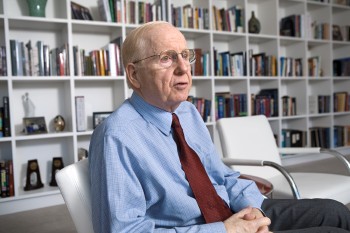UPDATE
Alumni voices are helping chart the road to 2015
For the past six months, Edward Lawler and seven of his faculty colleagues have been drafting a document that will offer some answers to a crucial question: What will Cornell look like in 2015? Lawler, the Martin P. Catherwood Professor of Industrial and Labor Relations and former dean of the ILR School, heads the Strategic Planning Advisory Council, which is helping plot the university's goals and objectives for the next five years. Lawler shared some of his thoughts about these goals, and the role alumni can play, with Ezra's editors.

Professor Edward Lawler See larger image
Some alumni are worried that Cornell will change radically over the next five years as a result of the strategic plan. How do you respond to their concerns?
The Cornell we all love will remain, but hopefully we will build even more strongly on its strengths and distinctiveness. This is our overarching purpose. I would look for a stronger culture in support of teaching; a more diverse community of faculty, students and staff; concerted efforts toward faculty renewal given the coming retirements; a few more departments reaching a leadership position in their field; and an even stronger impact on the world through a new push behind public engagement.
How can alumni get involved?
Through publications like this, we are asking alumni to send their comments and suggestions. Cornell is privileged to have dedicated and supportive alumni. We need your advice and thoughts on the content of the plan and your help in implementing it when it is completed. So, please send your comments and suggestions to strategicplanning2010@cornell.edu. We are also meeting with alumni whenever possible.
Strategic plans often end up forgotten in dusty binders. How do you plan to ensure that your work doesn't meet the same fate?
The president and provost are committed to operating with a strategic plan, and we are working to specify actions for each objective. We won't in all cases say exactly what should be done, but we will point in certain directions. The plan will offer a road map for moving the university forward but also will require regular if not continual modifications and adjustments. A good strategic plan is going to be a living, working document, even after it's finished.
What themes are emerging from the planning process?
They include how to promote faculty and staff excellence given intense competition and limited resources; diversity and inclusion; a distinctive education; collaboration across disciplines and colleges; and effective assessments of teaching, research and outreach. We're looking at the university as a whole, and thinking of Cornell as a singular unit, while recognizing and affirming the importance of strong and distinctive colleges and other academic units.
You have received ideas from four working groups, composed of 63 faculty, staff and students. What exactly are they telling you?
In October 2009 the provost created the council and the working groups, each of which explored one of the university's broad goals: education; research, scholarship and creativity; public engagement; and organizational stewardship. The council gave each group initial issues to address, and in December the groups provided input on those and others they deemed important. Then the council created an initial draft of objectives and actions for each goal. After additional feedback from working groups and university leaders, we prepared the draft outline.
When will the strategic plan be released?
The final plan is scheduled for completion in May.
Can alumni voices really affect the plan?
They can. We have gotten a lot of feedback to date, but over the next months I bet we'll hear things that we haven't heard or thought of and get good ideas for what we need to work on or clarify. The plan is about the university as a whole, and this is the chance for alumni, as an important part of that community, to give us their input.
The draft of the plan's outline is posted online at www.cornell.edu/reimagining/plan.cfm.